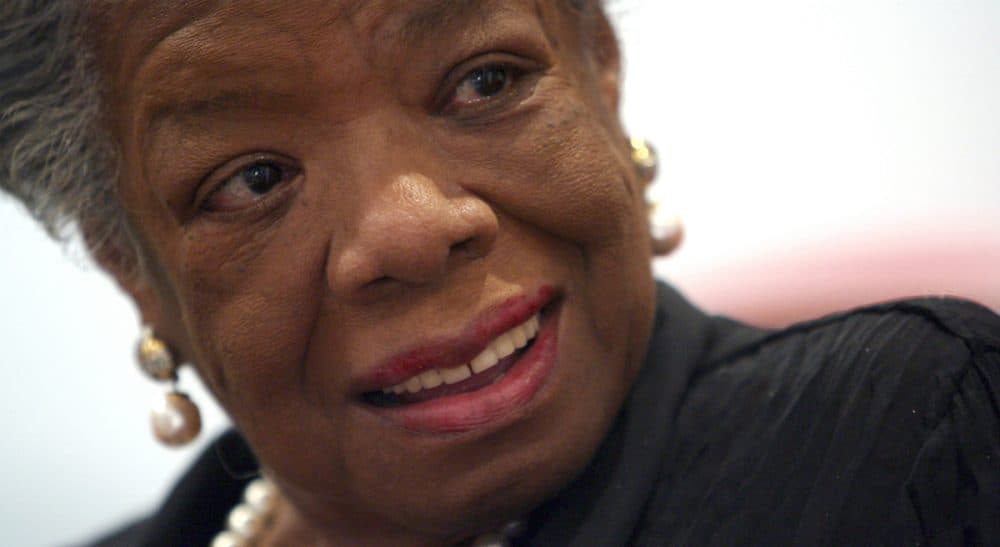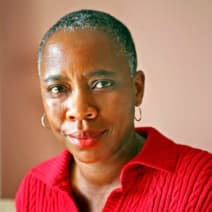Advertisement
Remembering Maya Angelou: 'Where Once There Was Silence, She Demanded To Be Heard'

“When a poet dies,” Maya Angelou wrote in January after the death of fellow writer and activist Amiri Baraka, “something hopeful in the national psyche disappears.” With Ms. Angelou’s passing, we are again left with a painful void in our cultural soul and social consciousness. At 86 and in frail health in recent years, Ms. Angelou’s death was not unexpected. Still, to imagine a world without her is to imagine Mount Everest crumbling to dust.
In more than four decades of poems, novels and memoirs, Angelou crafted an inimitable voice cured by heartache deeply felt but also fiercely conquered. She was to poetry what Bob Marley was to reggae, what Luciano Pavarotti was to opera: a figure so monumental, so vital, that even if the average person knew nothing else about her art form, they certainly recognized her.
Her 1969 autobiography “I Know Why the Caged Bird Sings” was a landmark, not only because of its unwavering depiction of black lives under the heel of the Jim Crow South, but because it validated every personal story of hardship endured by African-American women, stories that, before Angelou, had remained untold because too many believed they were not worth telling. That book is now a staple on school and university reading lists nationwide, though occasionally some still seek to censor it as if her unvarnished truths can ever truly be silenced.
In more than four decades of poems, novels and memoirs, Angelou, crafted an inimitable voice cured by heartache deeply felt but also fiercely conquered.
Born Marguerite Ann Johnson on April 4, 1928 in St. Louis, Angelou was raised in Stamps, Arkansas, which she remembered as a harsh place that, “with its dust and hate and narrowness was as South as it was possible to get.” In the book she recalls being raped as a child, and days after revealing the name of the man responsible, he was killed. Believing her voice, the utterance of his name, caused his death, she stopped speaking for five years. It was likely the last time Angelou was at a loss for words.
“I Know Why the Caged Bird Sings” became a bestseller, and echoed in the heart of every person who had been abused or disregarded, but found a way to demand respect and claim their dignity. Giving voice to those long seared by sexism and racism, Angelou found an instant and loyal audience among women and African-Americans, but hers was also a broader story about what means to keep hope and humanity alive when circumstances scheme to strip them away. More than just a lamentation, it also featured the sly humor and mischievousness for which Angelou was also well known. In essence, Angelou was never a caged bird; she was always a phoenix seeking light through the darkness and rising from the ashes of racism, sexism and sexual abuse.
Numerous rappers, from Common to Nas, also paid tribute. The Roots’ Black Thought called Angelou “a true lyricist,” and it’s an apt description. There was great rhythm in her words, and delivered in her singular cadence, she had a flow and swing that any rapper would envy — plus pathos and purpose in every line.
A mentor to presidents and hip-hop artists, a friend of Martin Luther King, Malcolm X, James Baldwin and Oprah Winfrey, Angelou’s was a life not merely well-lived, but one deserving of every accolade, including the Presidential Medal of Freedom she received from President Obama in 2010. Where once there was silence, she demanded to be heard, and raised the voices of millions regardless of race, gender or ethnicity. In a society which, at times can seem hostile to even the concept of your existence, Maya Angelou always reminded us that we owed it ourselves to not just survive, but to magnificently thrive.
Related:

